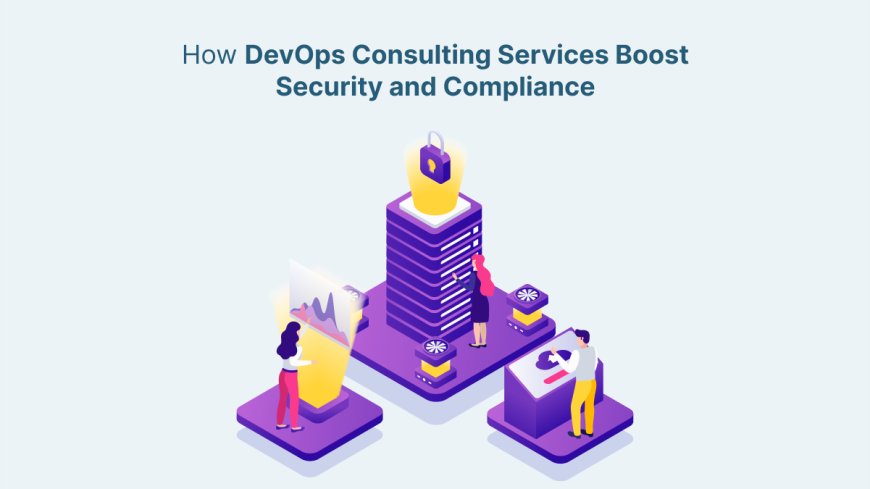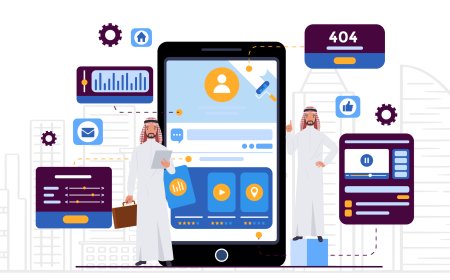How DevOps Consulting Services Boost Security and Compliance?
Explore how DevOps consulting services enhance security, ensure compliance, and help businesses stay resilient in a fast-changing digital world.

Introduction to DevOps Consulting and Business Security Needs
As digital technologies continue to evolve, businesses are expected to deliver software faster, more reliably, and with stronger security than ever before. This growing pressure has made DevOps an essential part of modern software development. But moving fast shouldn't mean sacrificing security or ignoring compliance regulations. Thats where DevOps consulting services come into play. They offer expert guidance to help businesses strike the right balance between rapid delivery and maintaining strong security standards.
DevOps is all about bridging the gap between development and operations teams to streamline software delivery. When combined with security practices, it becomes DevSecOpsa strategy that embeds security into every part of the software development lifecycle. In this blog, well dive into how DevOps consulting services can significantly boost your companys security posture while ensuring that compliance requirements are fully met.
Understanding Security and Compliance in the DevOps Era
What Does Security Mean in a DevOps Environment?
Security in the context of DevOps means protecting every part of your softwarefrom code to infrastructurewhile keeping up with fast-paced development cycles. It involves preventing unauthorized access, avoiding data breaches, and ensuring systems stay resilient against cyber threats. Traditional security methods often involved manual reviews and isolated checkpoints that slowed down the process. In contrast, DevOps enables continuous delivery, which requires continuous security checks as well.
DevOps consultants help set up automated tools and processes that detect vulnerabilities early, manage access controls, and monitor systems in real time. This shift-left approach pushes security measures to the beginning stages of development, preventing issues before they become critical problems.
What is Compliance and Why Does It Matter?
Compliance refers to adhering to legal, industry-specific, or internal standards that govern how data is handled and systems are managed. Depending on the industry, companies may need to follow regulations such as GDPR, HIPAA, PCI-DSS, or ISO standards. Failing to comply can lead to heavy penalties, data leaks, and loss of trust among customers.
DevOps consulting services play a vital role in aligning technical processes with these compliance rules. They help businesses implement practices that ensure audits can be passed easily, sensitive data is protected, and documentation is accurate and up to date.
Key Ways DevOps Consulting Improves Security
Shift-Left Security Practices
DevOps consulting firms focus on introducing security from the very first step of the development process. This is called shift-left security because it moves security tasks to the left side of the development timeline. Consultants help development teams integrate tools like static code analysis and vulnerability scanning into their everyday workflows.
By doing so, businesses can catch issues while writing code rather than after deployment. Fixing security flaws early is faster, cheaper, and less risky than patching systems later. This practice also reduces the chances of delays in production caused by last-minute security reviews.
Automation of Security Testing
Manual security testing can be time-consuming and inconsistent. DevOps consultants guide teams to automate testing procedures using tools that scan for known vulnerabilities, verify configuration standards, and enforce policies without needing constant human involvement.
Automation ensures that security checks happen consistently every time code is pushed or systems are updated. It also frees up security teams to focus on more complex issues rather than repeating basic tasks. This continuous feedback loop results in faster and more secure deployments.
Identity and Access Management
Controlling who has access to what is a fundamental part of security. DevOps consultants help businesses set up strong identity and access management (IAM) systems. These systems define user roles, permissions, and access levels to limit exposure to sensitive systems and data.
They often recommend using secrets management tools and multi-factor authentication (MFA) to reduce risks related to credential leaks. By ensuring that only authorized people can make changes to critical systems, companies can prevent many common security breaches.
Real-Time Monitoring and Incident Response
Another area where DevOps consulting boosts security is real-time monitoring. Consultants help businesses implement tools that continuously observe system performance and security metrics. When something goes wronglike an unauthorized login attempt or a sudden spike in trafficthe system sends alerts for immediate investigation.
This real-time approach allows businesses to respond to threats quickly and effectively. Instead of finding out about a data breach weeks later, companies are notified within minutes. Quick responses help contain threats and reduce damage.
Read more: How DevOps Consulting Accelerates Digital Transformation for Modern Businesses?
Enhancing Compliance Through DevOps
Audit-Ready Systems and Documentation
One of the most time-consuming parts of compliance is preparing for audits. DevOps consultants streamline this process by helping teams document processes, logs, and system changes automatically. Using version control and logging tools, companies can keep detailed records of what changes were made, when, and by whom.
This makes it easier to prove compliance during an audit and increases overall transparency. Automated documentation also helps internal teams stay informed and accountable.
Continuous Compliance Checks
Just as DevOps promotes continuous integration and delivery, DevOps consulting introduces the concept of continuous compliance. This means that compliance checks are not just a once-a-year activity but are built into the daily workflow.
Consultants help implement tools that scan codebases, infrastructure, and configurations against compliance standards in real time. If something goes out of alignment, teams are notified immediately and can take corrective actions. This proactive strategy prevents compliance issues from piling up and becoming a crisis later on.
Policy as Code
Policy as Code is a growing trend in DevOps security and compliance. It involves writing security and compliance rules in a format that can be read and executed by software tools. For example, a company might have a rule that all databases must be encrypted. Instead of manually checking each system, this rule is written as code and applied automatically across environments.
DevOps consultants help businesses implement this approach, making compliance enforcement scalable and consistent. It also reduces human error and speeds up approvals since policies can be checked and verified by machines.
The Role of DevOps Culture in Security and Compliance
DevOps is not just about toolsits also about culture. Consultants focus on building a culture of shared responsibility where every team member understands their role in maintaining security and compliance. Developers are trained to write secure code, operations teams monitor systems effectively, and leadership supports continuous improvement.
This cultural shift encourages open communication and reduces blame during incidents. When everyone is aligned and working together, it becomes much easier to detect, report, and resolve security and compliance issues.
Real-Life Impact of DevOps Consulting
Across industries like finance, healthcare, and e-commerce, companies that use DevOps consulting services have reported major improvements in security posture and compliance readiness. Financial institutions have reduced data breach risks by automating compliance checks. Healthcare companies have passed audits more smoothly thanks to real-time monitoring and clear documentation.
These real-world successes show that DevOps is not just a trendits a practical and effective way to manage security and compliance in fast-paced environments. With the right consulting partner, businesses can future-proof their systems against threats and regulations.
Conclusion
Security and compliance are no longer optionalthey are essential for businesses in any industry that handle customer data, operate online, or scale through digital platforms. DevOps consulting services offer the knowledge, tools, and strategies businesses need to stay secure while moving fast. From automating security testing and managing access to implementing continuous compliance and building audit-ready systems, DevOps consultants play a vital role in helping organizations stay ahead of risks and regulations.
By fostering a culture of security and embedding best practices throughout the software development lifecycle, DevOps ensures that security and compliance are not roadblocks, but enablers of innovation and growth. If you're looking to enhance your development process while staying compliant and secure, partnering with a reliable app development company that understands DevOps is a smart step forward. They bring not just coding expertise, but also the processes and experience needed to create safer, faster, and more scalable digital solutions for the future.
Frequently Asked Questions
What does DevOps consulting involve for security and compliance?
DevOps consulting includes assessing your current processes, introducing security best practices, automating testing, and helping you stay compliant with industry standards.
How does DevOps improve data security?
DevOps uses automation, real-time monitoring, and access control to protect sensitive data and prevent unauthorized access across development and deployment stages.
Can DevOps consulting help with audit preparation?
Yes, consultants help create audit-ready systems by automating documentation and logs, making it easier to demonstrate compliance during official reviews.
Is DevSecOps the same as DevOps?
DevSecOps is an extension of DevOps that places greater focus on integrating security into every stage of the software development lifecycle.
Do DevOps practices slow down development?
No, when implemented properly, DevOps speeds up development while improving quality and security through automation and better collaboration.







































